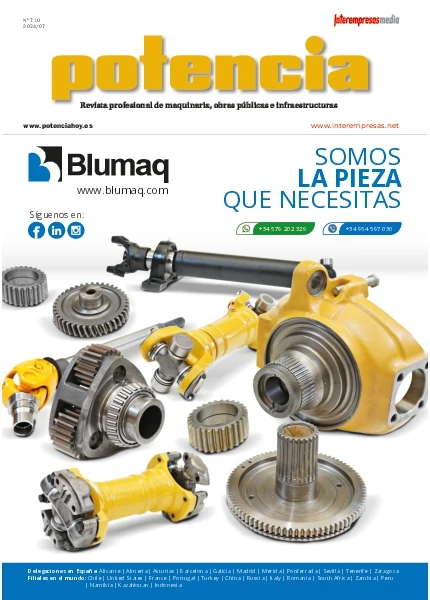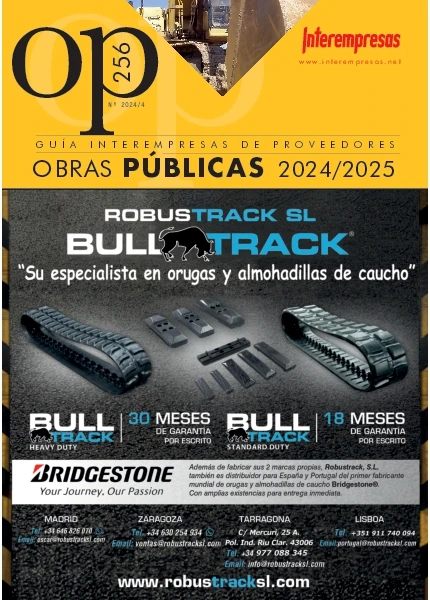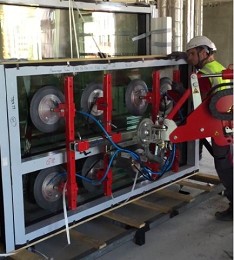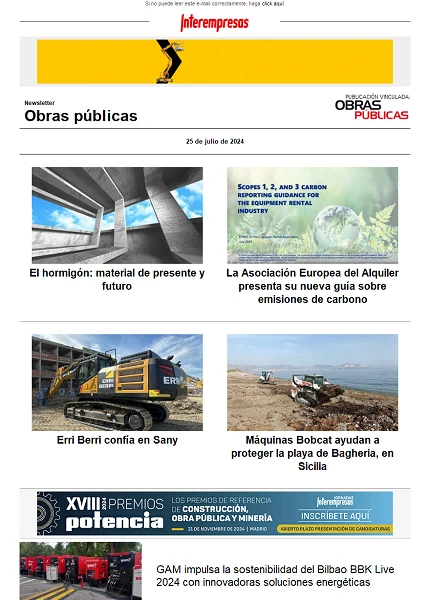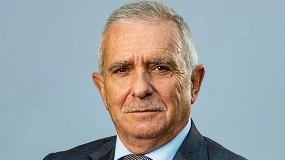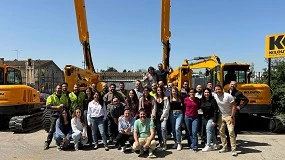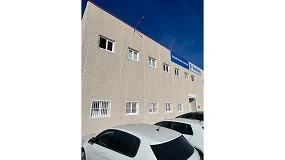Interview with Jacobo Díaz Pineda, director-general of the Spanish Road Association
October 15, 2009
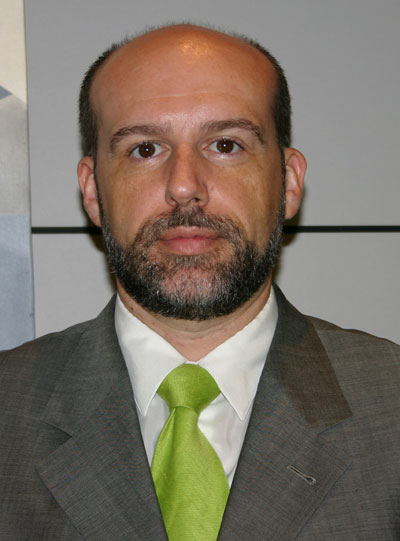
Could it take stock of these sixty year history of the Association?
Since its founding 60 years ago, the AEC has sought to bring together interests which do not always coincide, trying to become a rostrum from which to seek solutions to the problems of the sector. The daily challenge posed by our associative formula is precisely to find a balance between the public and private sectors, and between the various areas surrounding the highway in order to promote the road phenomenon as essential for social progresseconomic, cultural and of all kinds in any community.
Check, 60 years later, that we have the support of more than 300 representatives of the national road sector and international leads us to think that, during this time, we have walked in the right direction.
The sector has evolved a lot since the foundation of ACS. Where has there been more notice?
But, perhaps, one of the most important aspects is the progress experienced in the network of high capacity roads, whose length exceeds today the 14,000 kilometres, reaching the height of European countries in this regard. Nor should we forget the extraordinary reduction of deaths in road accident who is registering for five years, with rates above 40 per cent.
One of the activities of the Association is the development of research work. What kind of studies they perform? What outputs or real applications do?
Could I cite some examples?
Another of the lines of action of the ACS with clear practical applications is the participation in working groups drafting specific legislation on various issues. The Association has participated in this sense in the drafting of standards so important for road safety as the of the reflective vests, speed reducer and barriers metallic safety for motorcyclists, among others.
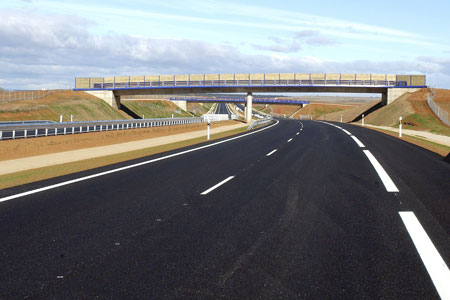
What, in his view, the current challenges of the sector?
Without proper conservation, it is difficult, if not impossible, to maintain a high quality of service in line with the European countries most advanced in this area.
Secondly, we must face the challenge of the environmental impact. In this area, progress is still huge: the use of recycled materials, techniques that reduce harmful emissions, the construction of more efficient vehicles and less energy… However, despite these advances, road transport continues to appear in public as primarily responsible for global pollution. And in the road sector not yet we have been able to transform the negative image and transmit it another dimension of the road that is compatible with the protection of the environment.
In this sense, surprised that virtually no one refers to the data provided by the European Environment Agency. According to this body, while a bus with its busy squares emits between 45 and 80 grams of CO2 by pasajero-kilómetro, a high-speed train reaches up to 165 g and a flight of short duration can arrive at the 240 grams. These figures make exposed a dimension of the roads not well-known by the general public that they should give.

Are our roads safe enough?
However, the conventional network is susceptible to many improvements. For example, to avoid accidents by Road exit, which they account for more than 30% of the total number of casualties. In this sense, you can identify sections of the road network with improved levels of containment (fixed obstacles, terraplenes…) but lacking adequate containment systems. For this reason, should incorporate the most innovative tools to ensure the safety of the roads in the phases of planning, design, construction and operation. Road safety audits and assessments of impact on road safety have proved to be very useful, and are already in place in many countries for several years.
Within this philosophy of work fall "roads to forgive", tracks whose design should minimize the consequences of accidents.
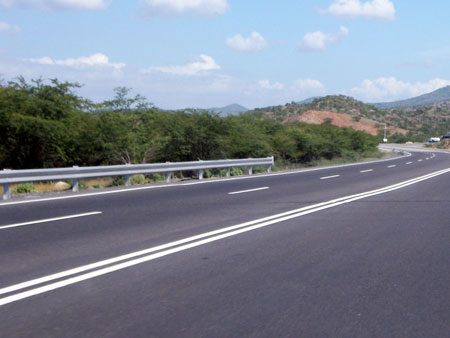
With regard to complaints from associations of bikers on the guardrails on our roads, what your opinion on this?
How would AEC solve this problem?
Do you think about the prohibition to go to more than 80 km/h. in the Barcelona area? Do you think that it is effective? Why?
And the card points?
This change of trend has been the result of the sum of various factors. I am referring to aspects such as the reform of the criminal code on traffic and road safety, the increase in surveillance of our roads, the improvement of many contentious points of the network, the increase of citizen awareness in the field of road safetyas well as the qualitative leap which has experienced in recent years the active and passive safety of vehicles.
"The Spanish Road Association was convinced that the qualitative and quantitative development of road infrastructure has become a political and social priority, and it dedicates its efforts for more than half a century," explains Díaz Pineda. To achieve this, it uses a series of tools - studies and research, sectoral meetings, and participation in technical committees, among others-, which are intended to cover all aspects relating to roads.
Road safety is, without doubt, one of the most important. And in this area, says the director-general of AEC, many studies and professional forums promoted by the Association. The drafting of the Green Book of road safety, with 77 proposals that ratcheted up the Congress stands out among them.
Another work is the collaboration with public administrations or private entities for the development of specific road safety plans. In this regard, Díaz Pineda highlights the advice to the Inter-American Development Bank in the preparation of a plan of road safety for Latin America and Caribbean.
Design, planning, construction and conservation
"But road safety is not our only front of action", says. Aspects such as the financing of infrastructure, design, planning, construction, conservation and management of roads are other fields where SRA is present. Without forgetting, of course, environmental and technological issues in which the Association works continuously. "All this is guaranteed by the existence of a diverse and plural associative base with representatives of the sectors more vigorous national and international road world", says Díaz Pineda.
Despite the campaigns that warn about the subject, many citizens driving under the influence of alcohol or drugs. What can be done in this regard?
And what you can do in these cases?
The AEC has over 300 partners from both private and public sector. Among the first, representatives of the Central governments, regional and Provincial. Also, ACS collaborates with the main associations that operate from various fields, in the road sector. "In the case of private enterprise, the representation of sectors is very wide: from signaling to the dealership, the construction and materials to the consultancy, passing through the management of infrastructure, intelligent transportation systems and road safety", explains Díaz Pineda.


